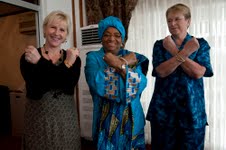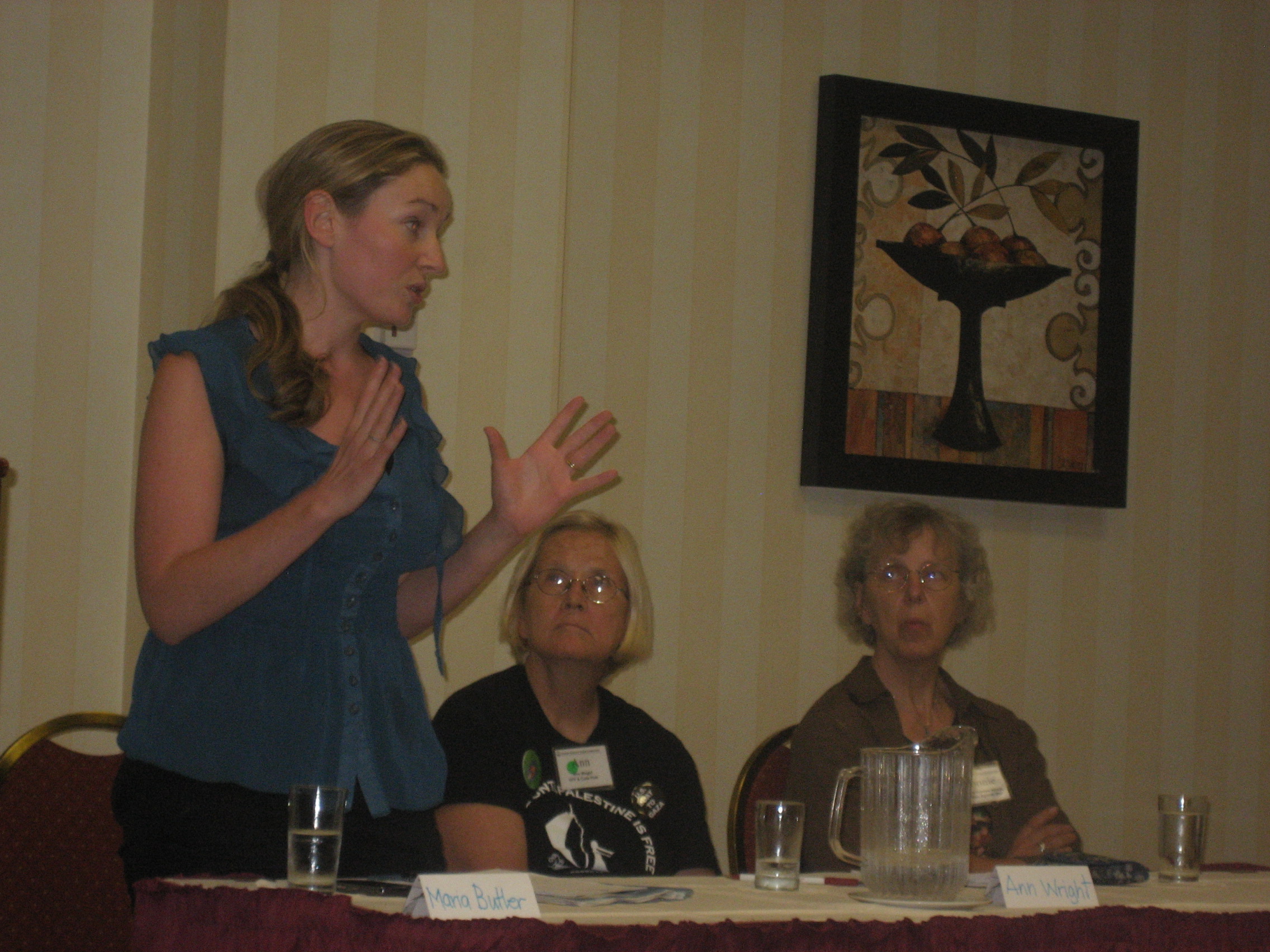Translating Promises into Practice
This 116 edition of PeaceWomen ENews features an special editorial from United Nations Special Representative of the Secretary General on Sexual Violence in Conflict Margot Wallström. This edition also includes featured women, peace and security news, events and resources from peacewomen.org, and updates on the 10th Anniversary of SCR 1325 (October 2010) and other recent women, peace and security information.
Please add your name to the UNIFEM Petition: SAY NO TO SEXUAL VIOLENCE IN CONFLICT. Click here>>.
This edition of PeaceWomen ENews features an editorial from United Nations Special Representative of the Secretary General on Sexual Violence in Conflict Margot Wallström. For the complete text, please click here. 
Picture: H.E. President Ellen Johnson Sirleaf of Liberia (center) takes a stand against sexual violence with UNMIL SRSG Ellen Margrethe Løj (right) and SRSG Margot Wallström (left) during their meeting to discuss ways to address sexual violence in Liberia, June 2010.
Ending Sexual Violence: Translating Promises into Practice
A decade since the Security Council first considered the agenda item Women, Peace and Security we are compelled to ask some difficult questions. Have we delivered peace and security for women? If our measure of success is not speeches but sanctions for war crimes against women, then the reign of impunity in places like the DRC and Liberia implies that promises on paper have rarely been translated into practice.
Readers of this newsletter are all too familiar with that reality. Resolution 1820 demands nothing less than the “immediate and complete cessation by all parties to armed conflict of all acts of sexual violence against civilians”. Yet rights and obligations have little impact unless they are known. The PeaceWomen Project is working to translate 1820 into local languages to put this powerful tool into the hands of women everywhere. It is a practical initiative, but one that is emblematic of our broader goal: translating international security policy into terms that are relevant and meaningful to women.
Resolution 1820 requires us to “debunk the myths that fuel sexual violence”. Perhaps the most insidious is the myth that rape is an inevitable corollary of conflict. This is deeply self-serving, allowing everyone from warlords to world leaders to shrug off their responsibility and say nothing can be done. No other human rights violation is routinely dismissed as inevitable.
Last month, I helped to launch an inventory of good practice by peacekeepers to prevent and deter conflict-related sexual violence. This shows that rape can be stopped if we build the skill and the will to respond. Peacekeepers and humanitarians will never have enough resources to meet all needs, but that cannot serve as an alibi for inaction.
In response to these changing dynamics of conflict, I have framed a five point priority agenda. My first point is ending impunity: ensuring that perpetrators do not remain at the helm of security institutions and that amnesty is not an option. Secondly, women must be empowered to seek redress and claim their rights. Women activists should never have to risk their lives to do their work. The third point is to mobilize political leadership so both traditional and non-traditional stakeholders feel accountable for the success of this agenda. Fourth is increasing recognition of rape as a tactic and consequence of conflict used to shred the social fabric and make peace less possible. Finally, I will drive and empower efforts to ensure a coordinated response from the UN system working through the inter-agency network UN Action Against Sexual Violence in Conflict.
To advance this agenda, my first field visit was to the DRC, where the UN estimates that a staggering 200,000 women have been raped during 12 years of conflict. I went there to listen to the survivors and relay their experiences to the Security Council, which I did during a closed session that followed the April open debate. In DRC, I was pleased to note that robust laws and policies are in place. Yet there remains a critical need for these to be backed by political will, resources and real capacity for implementation. I called for practical steps to be taken to establish a reliable payment chain for soldiers, garrisons to avoid commingling with and preying upon the population, as well as human rights training backed with disciplinary measures and military justice.
Similarly, in Liberia, I heard how the use of widespread and brutal sexual violence during the 14-year civil war left a profound imprint on society. Today, rape is the number one reported crime according to monthly police statistics. The aim of my mission was to ask why rape has persisted long after the guns have fallen silent. Among the structural drivers are high unemployment, low national capacity, alcohol and drug abuse, impunity and trauma carried over from the war. It is encouraging that the Government of Liberia has agreed to be the first country to host the new Team of Experts on the rule of law, mandated by Resolution 1888 to help combat impunity for sexual violence.
Both of my recent missions reinforced one critical point: survivors are their own best advocates. I hope to not only champion their cause, but to empower them to create a permanent and globally-networked pressure group. We all need to join forces to maintain the current momentum on 1325, 1820 and related resolutions well beyond the October milestone.
NGOWG Update
The NGO Working Group on Women, Peace and Security has released the August 2010 version of our Monthly Action Points (MAP) on Women, Peace and Security for the UN Security Council. For August, in which Russia has the Security Council Presidency, the MAP provides recommendations on country situations such as Iraq, Guinea, Kyrgyzstan, Lebanon, and Liberia. In addition, the MAP highlights the need for improved country reporting on women, peace and security Conflict.
To view the MAP for August (English), please click here.
Translation Update
PeaceWomen Speak Local Campaign
The aim of the Speak Local Campaign is to translate Security Council Resolution 1325 and 1820 into local languages around the globe in order to make the resolutions accessible to local communities.
The SCR1820 campaign is rapidly progressing with ten translations completed and many more forthcoming. Still, PeaceWomen needs help from as many partners as possible to make a direct impact on the implementation of this resolution and, in turn, on the grassroots efforts of women worldwide.
For more information, please click here, or email translations@peacewomen.org.
10th Anniversary of SRC 1325
The 10th Anniversary of SCR 1325 is approaching at a rapid pace. News, events, and initiatives are constantly being added to the compendium on the 1325+10 section of the PeaceWomen website.
Particularly worthy of note are the activities of WILPF Sweden and of WILPF United States, and the launch of their anniversary website.
Additionally, the Literature Repository is still accepting Papers. WILPF invites submission of papers on a broad range of issues around the implementation of 1325, as part of the Women, Peace and Security: From Resolution to Action Geneva High-Level Consultation 15-16 September 2010, Geneva. Details can be found here.
UNIFEM's Petition: SAY NO TO SEXUAL VIOLENCE IN CONFLICT
Women rarely fight the world's wars, but they often suffer the most. Resolution 1325 called for women's full and equal participation in all elements of peacemaking, and for prevention of sexual kind of violence. But implementation of this historic resolution has been too slow. More details about the petition can be found here.
To add your name to the petition, please click here.
WILPF Update
WILPF and Afghanistan Leaks: the Reality of War, Militarism and its Human and Economic Costs
On July, 25, 2010 WikiLeaks released a document set called the Afghan War Diary, an extraordinary compendium of over 91,000 reports covering the war in Afghanistan from 2004 to 2010. Julian Assange, the founder of WikiLeaks, stated purpose was to bring home the "every day squalor of war" and he has done that. In so doing he echoes the reason for the creation of WILPF in 1915 to “protest the madness and the horror of war”. Therefore, WILPF supports the courageous actions taken by Julian Assange and those who have provided the information to him. To read WILPF's entire statement on “Afghanistan Leaks: the Reality of War, Militarism and its Human and Economic Costs” please click here.
United National Peace Conference
The United National Peace Conference, held in Albany, NY from July 23-25, came to a close just hours before the controversial Afghan War Diaries were published by Wikileak and right before the US Congress voted for additional funding for the perpetual U.S. wars and occupations. Over the three-day period, thirty-three workshops on topics related to war and social justice brought together over 750 peace activists from across the country. Participants came from a range of perspectives and movements.
On Saturday July 24, Maria Butler, Associate of the PeaceWomen Project, presented on the Women Against War Panel, along with Col. Ann Wright, 1 of 3 State Dept officials who resigned in protest of the 2003 invasion of Iraq and had just returned from the Gaza Peace Flotilla, and Connie Frisbee Houde, from Albany Women Against War. Of the thirty-three workshops, this was the only one about women and peace. It was co-organized by WILPF-US.
Maria Butler speaks at the United National Peace Conference.



